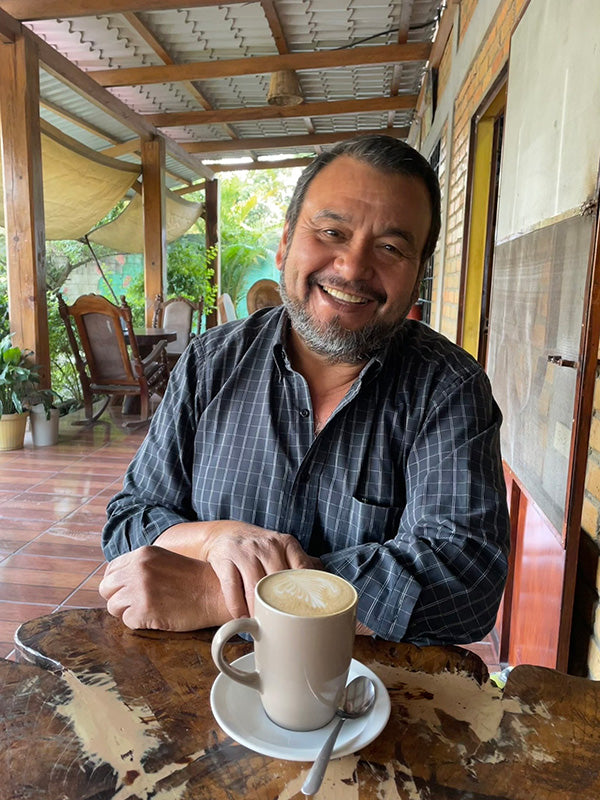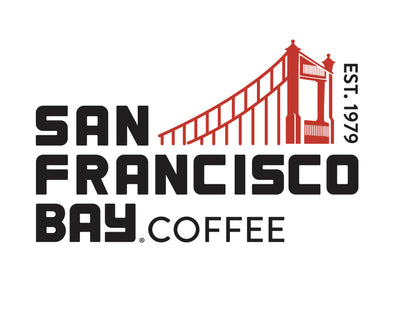MEET OUR FARMERS
Our Meet Our Farmers series provides a glimpse into the history, legacy and dedication of the farming families whom we partner with. When you purchase San Francisco Bay Coffee, you are joining our efforts to improve the lives of our farmers and those in their communities around the world.
René Edgardo Diaz Valenzuela, Honduras

Coffee farmer René Edgardo Diaz Valenzuela standing in the coffee patio at his farm, Finca Gualme, located in Gualme, Corquin, Copan, Honduras.
Coffee farming is a livelihood for many, but it is also a great passion for a lucky few. One such individual is René Edgardo Diaz Valenzuela, a lawyer by trade, who is currently harvesting his 34th coffee crop from his farm located in Gualme, Corquin, Copan, Honduras.
Nestled at 1,500 meters above sea level, Gualme is a rural, agricultural village adorned with coffee plantations, forest patches, assorted homes, bumpy rural roads and colorful tropical plants. The village boasts a cool and breezy climate, allowing coffee to grow and ripen with the ebb and flow of misty clouds that seep in and out of the valleys from the nearby Celaque mountain range. During the months of December to March, the focus is on harvesting, while from April onward, the coffee plants are busy flowering and slowly developing their fruits, with little green coffee beans plumping out in regular intervals along each of the coffee tree's branches.

View of Finca Gualme located in Gualme, Corquin, Copan, Honduras.
René Diaz Valenzuela's background as the son of an El Salvadoran father and Honduran mother shaped his upbringing in Santa Rosa de Copan, a small colonial city located on a high, flat plain in western Honduras. Growing up, he had no exposure to farming and aspired to become a doctor. René spent his childhood going to school and selling the locally produced "Copan Dry" soda pop on street corners. If he sold six cases, he earned enough to pay for a showing at the local movie theater. He and his siblings also assisted their mother at her market stall, where they prepared and sold typical Honduran lunch food as well as a variety of goods.
At the age of 14, René began working for the local branch of the Direccion General de Caminos y Obras Publicas. Despite being too young to legally work, René was determined to succeed and obtained a fake ID to qualify for a starting salary of 3 lempiras per day (USD $1.50) repairing city streets. Always taking on new challenges, René was soon promoted to assistant mason and later assistant carpenter. When he married at 17, he provided his wife, Insolina, with 1 lempira per day to feed the family.
In 1975, René began working as a forest manager at the Corporacion Hondurena de Desarrollo Forestal (COHDEFOR). When he was transferred from Santa Rosa to Tegucigalpa, the capital of Honduras, he hoped to study medicine at the university but found that classes weren't available at night. Seeking advice from a cousin, René was advised to "choose law" as it was an easy subject to pass. And so, René began his journey to become a lawyer.
Rene Diaz Valenzuela's background as the son of an El Salvadoran father and Honduran mother shaped his upbringing in Santa Rosa de Copan, a small colonial city located on a high, flat plain in western Honduras. Growing up, he had no exposure to farming and aspired to become a doctor. Rene spent his childhood going to school and selling the locally produced "Copan Dry" soda pop on street corners. If he sold six cases, he earned enough to pay for a showing at the local movie theater. He and his siblings also assisted their mother at her market stall, where they prepared and sold typical Honduran lunch food as well as a variety of goods.
At the age of 14, Rene began working for the local branch of the Direccion General de Caminos y Obras Publicas. Despite being too young to legally work, Rene was determined to succeed and obtained a fake ID to qualify for a starting salary of 3 lempiras per day (USD $1.50) repairing city streets. Always taking on new challenges, Rene was soon promoted to assistant mason and later assistant carpenter. When he married at 17, he provided his wife, Insolina, with 1 lempira per day to feed the family.
In 1975, Rene began working as a forest manager at the Corporacion Hondurena de Desarrollo Forestal (COHDEFOR). When he was transferred from Santa Rosa to Tegucigalpa, the capital of Honduras, he hoped to study medicine at the university but found that classes weren't available at night. Seeking advice from a cousin, Rene was advised to "choose law" as it was an easy subject to pass. And so, Rene began his journey to become a lawyer.

Left to right: Photos of René Diaz Valenzuela and his family. René's law degree.
René was a diligent student and graduated with an impressive 86.5% average, launching his career as a lawyer in 1986. One day in 1987, while working on a case for a coffee farmer from Gualme, Ocotepeque, René expressed his admiration for the beauty of the region and his wish to own a piece of land there for a weekend retreat. Little did he know that his casual comment would soon turn into a reality. Two weeks later, the same client appeared at René's office with an offer of a piece of land, which he had already purchased on René's behalf and demanded payment of $1,000 for the land and his services. Although taken aback by the unexpected turn of events, René decided to visit the land and see it for himself. Upon seeing the stunning beauty of the region, he was convinced that he should go through with the purchase. And so, René Diaz Valenzuela became the proud owner of his first piece of land in the coffee-growing region of western Honduras, just over the border from his birthplace in Chalatenango, El Salvador.
René's foray into coffee farming was not without its challenges, as he did not come from a coffee farming background. However, he was determined to learn and sought guidance from the local IHCAFE extensionist to help him get started. In 1987, he planted his first 12 manzanas of coffee farm with the traditional Caturra variety, and over time, he has built out his own locally crafted wet milling station. His commitment to quality is reflected in his careful cultivation practices, which include fertilization, pruning, and selective handpicking of only the ripest coffee cherries.

One of the most remarkable aspects of René's coffee farm is the community of people who have come together to support it. A family headed by patriarchs Reina, 68, and Roberto, 78, has been working with René for over 30 years, providing year-round maintenance and picking during harvest season. Together, the couple has 10 children and 29 grandchildren, all of whom collaborate in some way with farm activities. René has gone above and beyond to support this family, building adobe houses for each of their children to live in on the farm.

Left to right: Head farmhand, Roberto, a 30-year veteran of Finca Gualme. Reina surrounded by her grandchildren.
In addition to the family from Gualme, René also works with a community of people in Quelacasque, Lempira, who help with picking during harvest season. In a unique arrangement, René provides the community with money to fertilize their own crops of corn and beans in May, and they in turn provide him with labor during the picking season from December to March. This mutually beneficial relationship has lasted for 34 years and is a testament to René's commitment to building sustainable and equitable farming practices.
Despite the challenges of farming and the increasing pressures of globalization, René remains committed to his community and to producing high-quality coffee.
He recognizes that the allure of emigrating to the U.S. is a growing concern for many of his workers, but he continues to provide them with fair wages and a supportive environment. René's farm is a shining example of what can be accomplished when people come together to support one another and to cultivate a shared vision of sustainability and community.
Today, René's farm has grown to 30 manzanas, with a variety of coffee plants such as Parainema, Obata, IHCAFE-90, Lempira, Colombia and Catimor. Sadly, the 2013 coffee rust outbreak devastated the majority of the Caturra plantation.

As an innovator and problem-solver, René is always looking for ways to increase efficiencies on his farm. Currently, he's building a gondola system to transport coffee from the steep hillsides at the back of the plantation to higher ground near the wet-milling station. This will save time and energy for workers who previously had to carry the coffee up the slope or take a long detour on horseback.
Despite his dedication to farming, René acknowledges the increasing challenges faced by farmers today. Labor is scarce, with many men of working age in rural villages emigrating to the U.S. Fertilizer prices have skyrocketed, and few buyers pay enough to cover the cost of production.
René reflects on how increasingly difficult farming has become. In the past, coffee prices were higher relative to costs, the land was more fertile, and climate change wasn't yet such a major issue. However, from 2013 to 2017, René didn't turn a profit from his farm and actually lost money. Although he has other income from his law practice to subsidize the farm, many farmers don't have that option. René's children even joke that his farm is an expensive hobby. Fortunately, René's fortunes turned around in 2015 when he began selling to San Francisco Bay Coffee. Thanks to this partnership, René has been able to see profits again from coffee farming.
René is not just a successful farmer but a family-oriented man who takes pleasure in music and charitable work. He has six children, all accomplished professionals, though none have chosen to follow in his footsteps and become farmers. René is passionate about music, singing, and playing the guitar and keyboard. With two of his children, Hector and Carlos, he formed a charitable musical ensemble called Lawyer’s Combo, performing for the elderly, teachers, and public servants on special occasions. René was also a freemason for many years but withdrew when he felt that members of his chapter were not living up to the brotherhood's ethics. Since 1986, he has been a full-time, well-respected lawyer, providing expert legal assistance throughout Honduras.

René's band Lawyer’s Combo, Santa Rosa de Copan

Regarding his future in farming, René expresses concern that he may be nearing the end of his farming career as labor becomes scarce. However, he remains committed to his passion, saying, "I will keep going as long as I can because I farm for the joy of it. This plantation is my medicine and my happiness. It is a different challenge each day of each year to make the farm produce under changing climate and market conditions. No two harvests are ever the same." When asked what he is most proud of as a farmer, he beams and says, "I am very proud of the quality I produce, and I keep farming to show the world that Honduras has great coffee, and its farmers are among the best in the world."
Despite the challenges of farming, René has found renewed success thanks to San Francisco Bay Coffee, which has helped him earn a living from his farm once again.



